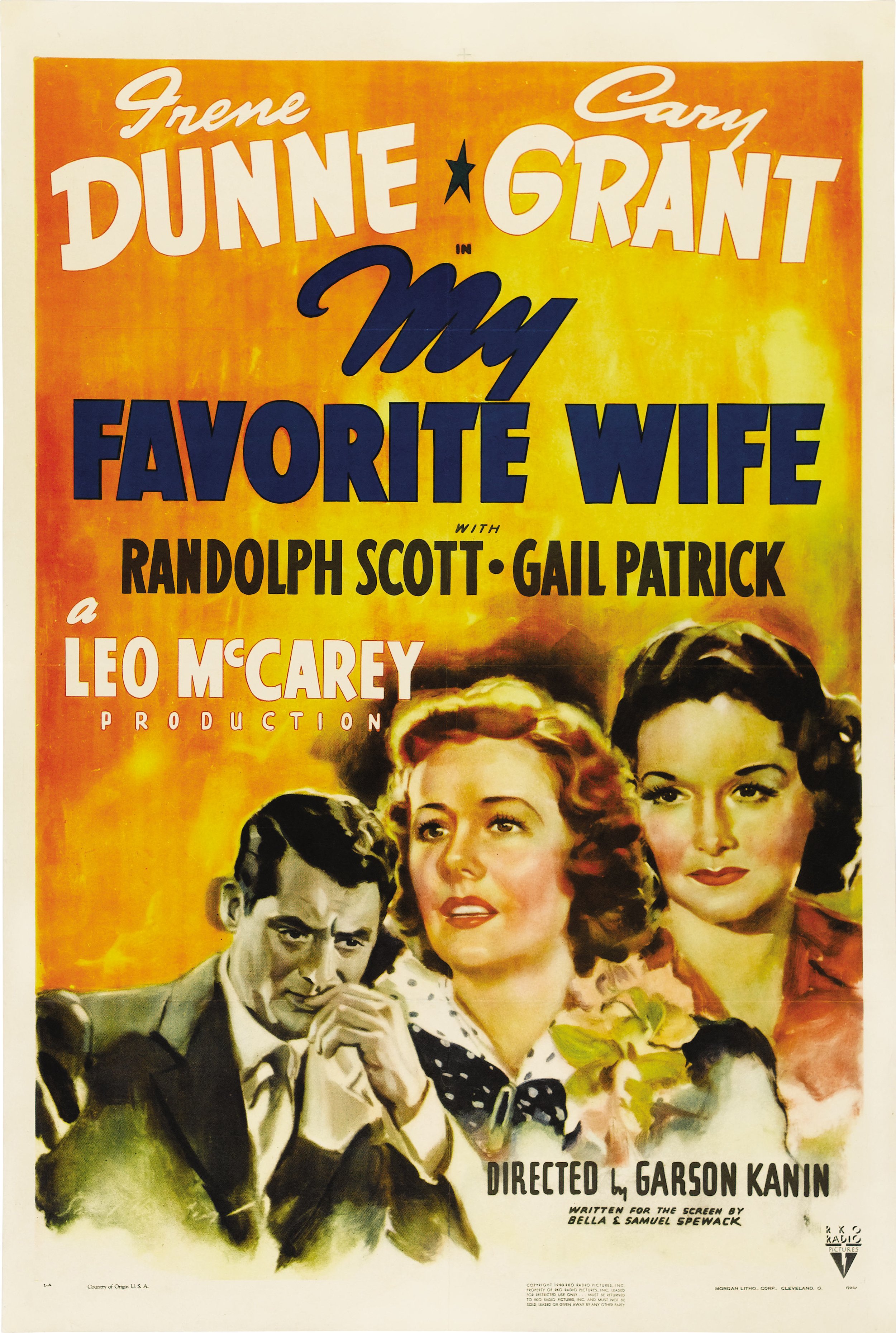Irene Dunne & Cary Grant: My Favorite Wife (1940, dir. Garson Kanin, US) by Matt Olsen
Three years after the success of The Awful Truth, Irene Dunne & Cary Grant were paired again in another screwball comedy produced and co-written by that first film’s director, Leo McCarey. This reunion leans heavily – and I do mean heavily – on the foundation laid by its predecessor. Though the names are different, the lead characters are essentially the same: urbane, witty, and navigating a difficult marital situation. Dunne is more confident and decisive, Grant more flustered and circumspect. The narrative structure even matches the first – minimal exposition, clear act breaks, competing romantic partners, and an almost identical resolution. If the guiding notion was “if it’s not broken, don’t fix it” then they mostly succeeded. Except that the premise this time is, to coin a phrase, totally bonkers.
The film begins in a courtroom. Attorney Nick Arden (Cary Grant) stands before a judge attempting to explain a rather complex situation: the state of his marriage. Nick’s wife, Ellen Wagstaff Arden (Irene Dunne), disappeared seven years earlier while on an anthropological expedition in Indo-China and, despite an exhaustive search, hasn’t been seen since. Nick is present to petition the judge to declare his wife legally dead. Not necessarily the usual fodder for a wacky comedy but the secondary goal is less atypical – until his wife is officially dead, he can’t legally remarry. A consummation which Nick has efficiently scheduled to occur in that same courtroom immediately following the judgment.
Not to distract from the fundamental focus of this series, namely the chemistry between Irene Dunne and Cary Grant, but this five-minute introductory scene between Grant and Judge Bryson is a beautiful piece of comic perfection. Due in no small part to the fairly small part of the judge himself, played by Granville Bates, a character actor with a staggering 89 film credits from 1930-1940! Bryson begins at a base level of simmering irritation which is only exacerbated by the complexity of Nick’s case, though never approaching a point of irrationality. The scene is played throughout with a wonderful restraint from all parties. Nick and his fiancée (also present in the courtroom) remain respectful and deferential to the judge, despite a frustration with his exceedingly gradual comprehension of their situation. To begin a ludicrous story like this at such a quiet, relaxed pace demonstrates an admirable and justified level of confidence.
Exposition thusly dispatched, the new couple en route to their honeymoon, the story can begin at full pace. Such that, it’s barely five-minutes in that Nick’s presumed-dead wife, Ellen, rescued by an off-course Taiwanese freighter, reappears at the door of her / his / their old house. Complications are the key to any comedy and this one is nothing less than a doozy but it’s also only the first.
In inevitable comparison to The Awful Truth, My Favorite Wife suffers. The first act drags and hangs too much on Nick’s inaction. It’s one of those situations where the audience sees the solution with a clarity that seemingly eludes anyone on screen. Which is fun… for a while but eventually becomes grating. In trying to juggle his sudden reality of having simultaneous wives, Nick treats his new bride extremely poorly. As a result, his character becomes unsympathetic for a large part of the first half.
Thankfully, an entirely new complication appears in the second act with the introduction of Randolph Scott as… well, it’s probably more fun not to disclose that particular development. Again, the word “doozy” feels most appropriate.
It’s in that middle of the story that the Dunne / Grant dynamic shines as each tries to outfox the other. Culminating in a terrific (and familiar) scene where Ellen’s attempt at well-intentioned deceit collapses in front of her. As in a similar moment in The Awful Truth with Grant abandoning pretense and choosing to laugh at the ridiculousness of the situation instead, it’s Dunne that falls into laughter when her lie falls apart. It’s a gleeful, shrugging admission of failure that defuses the situation at once without her accepting any loss of position. It’s an acknowledgement of being caught but without any sense of shame – in a good way!
The last act rests on muddied motivations and, as mentioned, becomes an almost duplicate of The Awful Truth’s. The final negotiation between the two leads feels overly manipulated here, though, and doesn’t quite match either the profound absurdity or intense eroticism of the first film’s ending. Despite its potentially sacrilegious (or at least eyebrow-raising) implication.
Flawed as it may be, there are still several factors to recommend My Favorite Wife. Especially, but not exclusively, the three razor-sharp comic performances from Dunne, Grant, and Granville Bates as Judge Bryson who delightfully reappears at the beginning of the third act to officiate the interested parties’ separations and mergers, issue twenty-five-dollar fines for contempt of court, and nearly steal the whole movie.
Matt Olsen is a largely unemployed part-time writer and even more part-time commercial actor living once again in Seattle after escaping from Los Angeles like Kurt Russell in that movie about the guy who escapes from Los Angeles.


